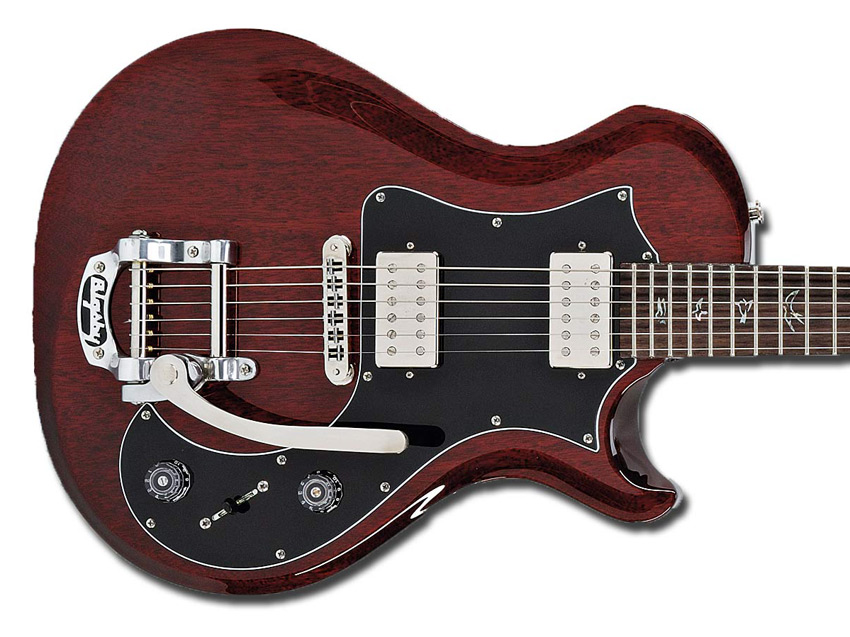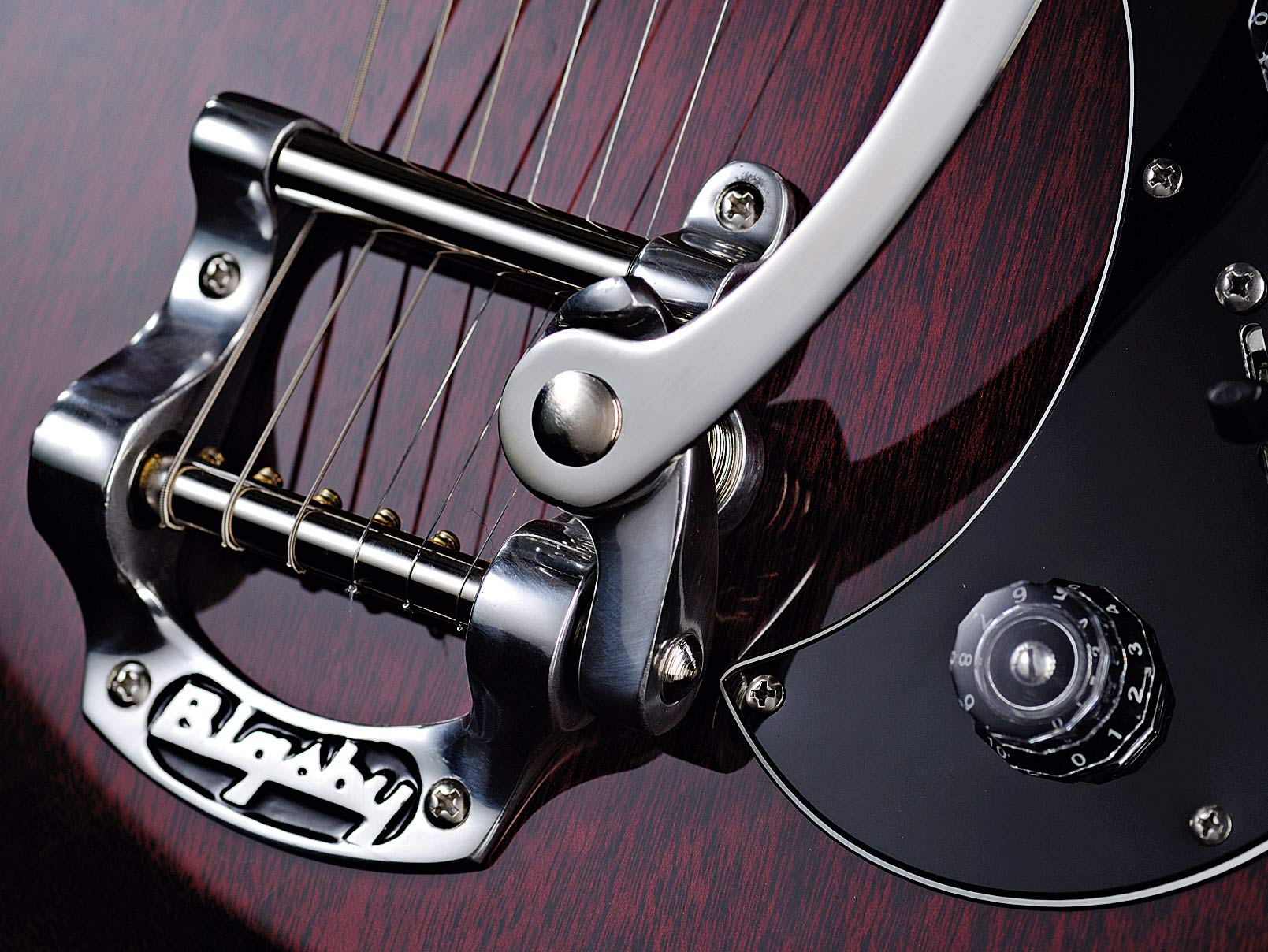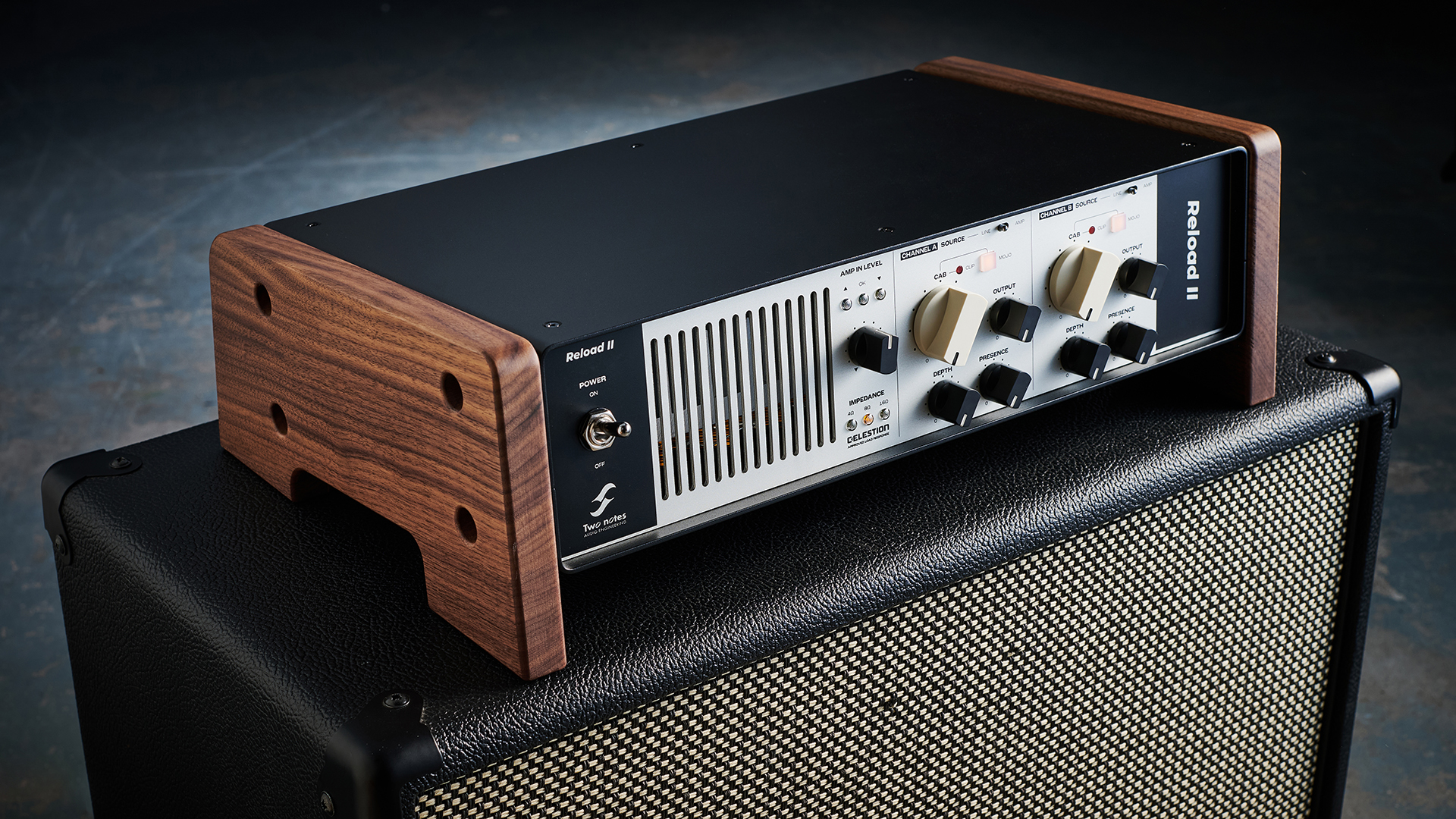MusicRadar Verdict
Continuing on from the Mira, the Starla goes in search of a new audience and image for PRS. A success? We say, yes!
Pros
- +
Strong retro vibe. Characterful tones. Bigsby.
Cons
- -
Bigsby set-up needed a tweak. No locking tuners.
MusicRadar's got your back

PRS Starla

PRS Starla
It's getting hard to second guess PRS, and never more so than with this new model that brings a Bigsby vibrato to a completely new, and very retro, model. It seems PRS is going forwards and backwards at the same time.
Introduced at the recent Experience PRS event, the Starla is another Joe Knaggs design. It comes a year after the Knaggs-designed Mira that first signalled an attempt by PRS to court a different style of player. "It's our way of going a bit more in the retro direction, the indie market if you like," explains PRS's Peter Wolf.
If the 24-fret Mira went for a more SG-like vibe with its double-cut, thinner all-mahogany body, standard PRS 25-inch scale and Stop-Tail bridge, the 22-fret Starla uses a slightly altered PRS Singlecut body outline, the shorter 24.5-inch 'Santana' scale, a Bigsby and new Starla pickups.
Bling-free
But like the Mira (aside from the maple top version added earlier this year), the Starla is equally bling-free with limited and quite muted colours, no figured maple top or gold hardware. The only option is the (expensive) bird inlays as featured here.
The face of the 42mm thick body is contoured like the Mira - not quite a carve but a little more than a chamfer - and we get a belly-cut on the rear. Only a 22-fret wide-fat neck is offered here (the Mira is offered with either the regular or wide-thin shapes).
Along with a scale length that's 12.7mm shorter, the feel is a little different - the neck sticks out less from the body thanks to the single-cut outline and it joins body at the 16th not the 23rd fret. It's a shorter length and stiffer neck at the expense of higher fret comfort. By design, this isn't a 'virtuoso' guitar.
Aside from the Grover tune-o-matic bridge and Bigsby - "not the first time we've used a Bigsby, we've probably put 10 or 20 on Private Stock guitars, but it is the first time we've used one on a production model," says Knaggs - and the slight oddity that this guitar features non-locking Kluson vintage-style tuners (not the locking PRS tuners fitted on the non-vibrato Mira), the other changes come with the new Starla pickups with Alnico 'X' magnets.
"The 'X' stands for 'not for public knowledge'," says J Hayes rather mysteriously. "The pickup is designed to have an extended range and a flat response."
"Paul and the folks in the pickup area developed these pickups to be really clean and really full," continues Knaggs. "They're actually my personal favourite pickups that we've come up with. They give that sound of '50s and '60s music, also guys like Chris Isaak. The bass and the high-end are prevalent, less mids, perfect for beautiful rhythms and super clean tones. Great for jazz, but what I notice is that it's perfect for older rock 'n' roll and rockabilly, especially with the Bigsby."
Sounds
If the original Mira ditched the bling and went for quite a Gibbo-like tonality, the Starla offers a different, more Gretsch-y, take on the same ballpark tone. It's brighter overall with less smooth mids, a sound that references Gretsch and Epiphone, FilterTron and mini-humbucker more than the Gibson humbucker. Coil-split, the differences are bigger still, and with a clean-ish amp there are timeless pop sounds - ringing and naked, uncoloured and jangly.
The full coils still have plenty of poke adding grit but not in a 'rock' sense. It's a little more leftfield, a little more punky and certainly not the smooth 'Santana' tone that many of us hear when we think of PRS. The volume control, when reduced, smooths out some of the highs and with a little tone reduction we start getting into jazzier territories with impressive clarity and depth.
Here's Guitarist's Simon Bradley giving the Starla a workout:
Bigsby benefits
The Bigsby certainly adds its own magic, those light shimmers and a seemingly more open resonance again hark back to those harmonically rich cleaner tones of the '50s and '60s - especially with some slap-back or more ambient delays and older style vibe-like modulation.
But up the gain and volume and you're into edgier Neil Young-like voices, especially with the Bigsby, and if you like a bit of sonic mangling this is the guitar to do it with. Our sample seemed a little microphonic so we could easily induce some quite tuneful feedback, almost as if it were a semi.
Again, great for textures or all-out wheels coming off Bigbsy madness. If the Mira opened the door, the Starla has bolted through it to reclaim sounds many of us thought we'd never hear from a PRS - it's like finding the best funky, vibe-y retro guitar, that's well-built and stays in tune (albeit not as well as a 'normal' PRS).
With the quality of construction and finishing a byword at PRS - to be honest it's getting better - it's no surprise that this guitars are pro-spec'd and ready to go.
Admittedly, the Bigsby does need a little TLC and we're a bit surprised not to see locking tuners. But that aside, the Starla is a genuinely inspirational instrument, full of evocative old-school tones that suit numerous cleaner styles or rasping, left-field, punkier gains.
This is a whole new avenue for PRS - clearly, the next 12 months are going to be interesting.
Dave Burrluck is one of the world’s most experienced guitar journalists, who started writing back in the '80s for International Musician and Recording World, co-founded The Guitar Magazine and has been the Gear Reviews Editor of Guitarist magazine for the past two decades. Along the way, Dave has been the sole author of The PRS Guitar Book and The Player's Guide to Guitar Maintenance as well as contributing to numerous other books on the electric guitar. Dave is an active gigging and recording musician and still finds time to make, repair and mod guitars, not least for Guitarist’s The Mod Squad.
“This update reflects everything we believe modern gear should be”: Neural DSP gives the Nano Cortex an almighty power-up with free NanOS 2.0.0 system update
“It’s honestly got me thinking hard about adding one to my own studio set up”: Two Notes Reload II review
“Gloriously adorned with a gold edge burst finish over a gold paisley and sparkle top”: Gretsch unveils the Paisley Penguin – a rare bird that growls – and the Honey Dipper Special, a resonator for all your roots rock manoeuvres










